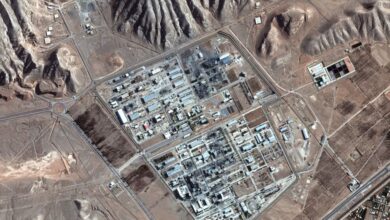Following reports that the Egyptian company responsible for exporting natural gas to Israel decided to cut off shipments, both Israeli and Egyptian officials have rushed to downplay the crisis, saying the move resulted from commercial considerations, not political ones.
But despite these efforts, Israeli media fear the unilateral move represents a step toward Egypt deciding to shelve the two nations’ bilateral peace accord in place since 1979.
“We don’t see this gas cutoff as something that is borne out of political developments,” Israeli Prime Minister Benjamin Netanyahu said Monday. “This is actually a business dispute between the Israeli company and the Egyptian company.”
Foreign Minister Avigdor Lieberman provided a similar interpretation.
“We want to understand this as a trade dispute. I think that to turn a business dispute into a diplomatic dispute would be a mistake,” he told Israeli radio stations.
Egyptian officials confirmed that they, too, viewed the halt as a result of commercial considerations.
Mohamed Shoeib, head of the Egyptian Natural Gas Holding Company (EGAS), which is in charge of the gas exports to Israel, had announced termination in response to what he said was “Israel’s repeated breaching of the agreement,” namely its purported failure to pay money that was owed for past shipments.
People’s Assembly Speaker Saad al-Katatny also said the decision resulted from Israel’s failure to pay.
But Israeli journalists and commentators, who insist the cancellation has strong political implications, are challenging the official narrative.
In a news broadcast Monday evening, economic analyst Elad Simchayoff of Channel 2 — Israel’s most popular television news network — argued that despite attempts by officials to play down the decision, “there is no doubt, even if we are only talking about money, that the current timing of such an issue can have very problematic repercussions in the future.”
In the background, the viewer could see Egyptian troops idling by as a distant pipeline gushed flames. For the Israeli audience, no explanation was needed. Pictures more than suffice to recall the 14 attacks on the Sinai pipeline since Mubarak’s ouster in February 2011, which have shut down gas shipments to Israel even before Cairo made the official decision to halt exports.
The report then showed former Israeli Ambassador to Egypt Yitzhak Levanon explaining that when dealing with Egypt, politics are inescapable.
“With the relations we have with Egypt, everything has a political aspect, and we have to take that into account,” he said.
In an article in the left-leaning Haaretz, journalists Avi Issacharoff and Amos Harel marveled at what they interpret as anti-Israel hatred so great that it overrides economic interests. They went so far as to call the decision “economic suicide” for Egypt.
“One could expect that a country that has lost a considerable amount of tourism in the past year, that suffers from worsening poverty, a disappearance of foreign investments, unemployment and, in short, a particularly dark economic future, would guard over a source of income so important like that gas deal,” they wrote, emphasizing the political nature of the decision.
On Channel 10, Israel’s second most popular news network, Hezi Siman Tov said Israeli pronouncements belie real political concerns.
“Israel politicians understand that we have reached another low in relations with Egypt,” he said.
The broadcast then switched to Ehud Barak expressing his hope that Egypt would respect all international agreements, especially the peace treaty with Israel.
Media outlets focus on the fact that virtually all Egyptians — conservative and liberal, religious and secular — support the halting of gas exports to Israel. Channel 2 shows a clip from Ibrahim Eissa’s Monday night broadcast from his talk show “Fil Midan” (In the Square). In the clip, Eissa, a prominent liberal commentator, places an Egyptian flag on top of a green gas cylinder.
“We’ve won the gas battle,” says Eissa, who bursts out in patriotic song and compares the victory with that of crossing of Bar-Lev Line during the 1973 Arab-Israeli War.
Several Israeli media outlets have reported on prominent Egyptians lauding the decision, including presidential hopefuls Abdel Moneim Abouel Fotouh and Hamdeen Sabbahi, as well as Nour Party head Emad Abdel Ghafour. They quote Abouel Fotouh as saying, “The Egyptian people do not want to export gas to Israel and the president must act according to their wishes.”
What the outlets fail to provide is context for why many Egyptians are happy to see the cessation of the exports. One of the reasons is that most Egyptians believe that Israel was receiving the gas at below-market prices, due to the corruption of the Mubarak regime. Egyptians believe gas exports to Israel are squandering the country’s resources, rather than serving as lucrative trade commodities.
A second reason not addressed is that Egypt has faced chronic shortages of butane gas cylinders for months. The idea that Israel, its former enemy and ongoing occupier of Palestinian lands, received natural gas at discount rates has only exacerbated feelings of injustice.
Ehud Yaari, a prominent Arab affairs commentator for Channel 2, focused on Tantawi’s bellicose language on Monday and warned that tensions could worsen.
“We’re seeing a steep escalation in rhetoric and words have power, particularly political power,” he said. “First off, the number one guy in the military council, [Field Marshal Hussein] Tantawi, employed a tone today that he generally doesn’t use. He said: ‘We will break the legs of anyone who approaches the border.’ He doesn’t mean the border with Libya or Sudan, he means the Israeli border.”
Yaari fails to mention that Tantawi’s threats came in reaction to Lieberman’s belligerent comments the day before, when he was quoted by the second most widely distributed Hebrew daily Maariv as saying that Egypt is a bigger threat than Iran, and Israel should send additional troops to its Sinai border in response to recent political developments. Shlomi Eldar, in a broadcast from Channel 10, does provide this context, as well as Tantawi’s pledge, in the context of the breaking-legs comment, that Egypt would not attack its neighbors.
In Yediot Aharonoth, Israel’s most widely read daily, suspicions of political motivations for canceling the deal find expression in an unnamed senior Israeli official: “The main goal of the Egyptian decision is to appease public opinion, especially given that presidential elections are coming up,” reports Roi Kais.
Meantime, prominent journalist Boaz Bismuth of the right-wing paper Israel Hayom sees the deal’s cancellation as just one more consequence of Mubarak’s departure, but one that confirms Egypt’s ineluctable escalation to war with Israel.
“Jerusalem’s pessimistic forecasts are becoming reality,” he writes. For example, many predicted that the Brotherhood would dominate Parliament and the Israeli Embassy would become targets of violence — all that came true.
“At this rate, our southern neighbor may become an enemy state sooner than expected,” he writes in the op-ed. “I hope that I am wrong, but I also hoped that the predictions that came true were wrong.”
Writer Hezi Sternlicht, whose op-ed is also featured in Israel Hayom, captures the same pessimism in different words.
“The collapse of our gas deal with Egypt leads us to the painful conclusion that we are gradually returning to the days before the Camp David Accords,” he writes. Israel and Egypt fought five wars between 1948 when Israel was created and 1979 when the two countries signed their peace treaty.
Siman Tov from Channel 10 shows masses of Egyptians cheering in Tahrir Square and burning an Israeli flag. These Egyptians, which include many from the Muslim Brotherhood, he says, represent an Egypt looking to cancel the treaty and “declare Israel an enemy state.”
“In an Egypt like this, the gas deal’s cancellation appears like just the beginning,” Siman Tov says.




